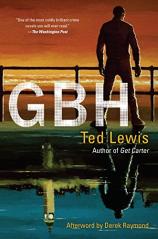GBH
Review
GBH
Get ready to have your skull blasted quickly and quietly off your neck. Ted Lewis (and, let me assure you, we are not talking about the American bandleader here) is almost unanimously regarded as the father of British noir fiction. He arguably is best known in the United States as the author of the (retitled) GET CARTER, which was adapted for film on three separate occasions. GBH, the reason we are here at the moment, was published in Great Britain in 1980 and almost immediately went out of print; it has not seen the light of day in the US until now. Thanks to the indispensable Soho Crime imprint, our wandering in the literary desert has come to an end. This is a book not to be missed.
Lewis was not a writer for all of his professional life. He first tried his hand at animation; if you’ve watched the movie Yellow Submarine, you’ve seen his imprint. This book is about as far from that film as you can get on the continuum. GBH, which stands for “Grievous Bodily Harm” in the British criminal code, is present aplenty in the book that bears its name. Do not think for a second, though, that GBH is a series of violent vignettes strung together by short interludes. No, it is narrated in a rough but beauteous literary form that can be appreciated not only for what Lewis does but how he does it.
"It is like a sip of Absinthe on a three-day empty stomach, a book that will chill you and ricochet your thought process at least temporarily, if not permanently."
The subject matter is kind of rough, which may be why the book failed to find acceptance in Britain when it was originally published some 35 years ago. The narrator of the piece is George Fowler, who is somewhat of an unusual protagonist, to say the least. He is/was the ruler of an extremely profitable criminal enterprise that specializes in the manufacture and distribution of pornography of a particularly despicable sort.
The narrative proceeds along alternating tracks. One is called “The Smoke” and takes place almost entirely in London. We see Fowler as he sees himself, the master of all that he surveys with the ability to satisfy any and all of his carnal desires at whim. However, he gets the sense that someone within his empire is trying to take him down. There is an almost Shakespearean element that shoots through “The Smoke,” as Fowler loses faith and trust in more and more of his associates, choosing to rely (perhaps unwisely) on a dwindling number of advisors.
The other narrative track, interspersed with “The Smoke,” is called “The Sea” and takes place in the nominal present. Fowler has experienced a fall from his dark and corrupt grace, and is hiding out in a small British beach town. Bloodied but unbowed, unbroken though bent, Fowler is marshaling his few remaining resources to regain his criminal empire, even as events continue to conspire against him. One can almost see what is coming before Fowler does, yet you’ll want to read every bit of the book not only to find out if you’re right, but also to see how Lewis gets you (and Fowler) to the end.
GBH will appeal to fans of noir crime fiction, but readers who generally favor literary works over genre fiction should be pleased with it as well. It is like a sip of Absinthe on a three-day empty stomach, a book that will chill you and ricochet your thought process at least temporarily, if not permanently. And hopefully, with Soho Crime’s reprinting of Lewis’ other works, it will bring the man the attention he has deserved for so long.
Reviewed by Joe Hartlaub on May 1, 2015





